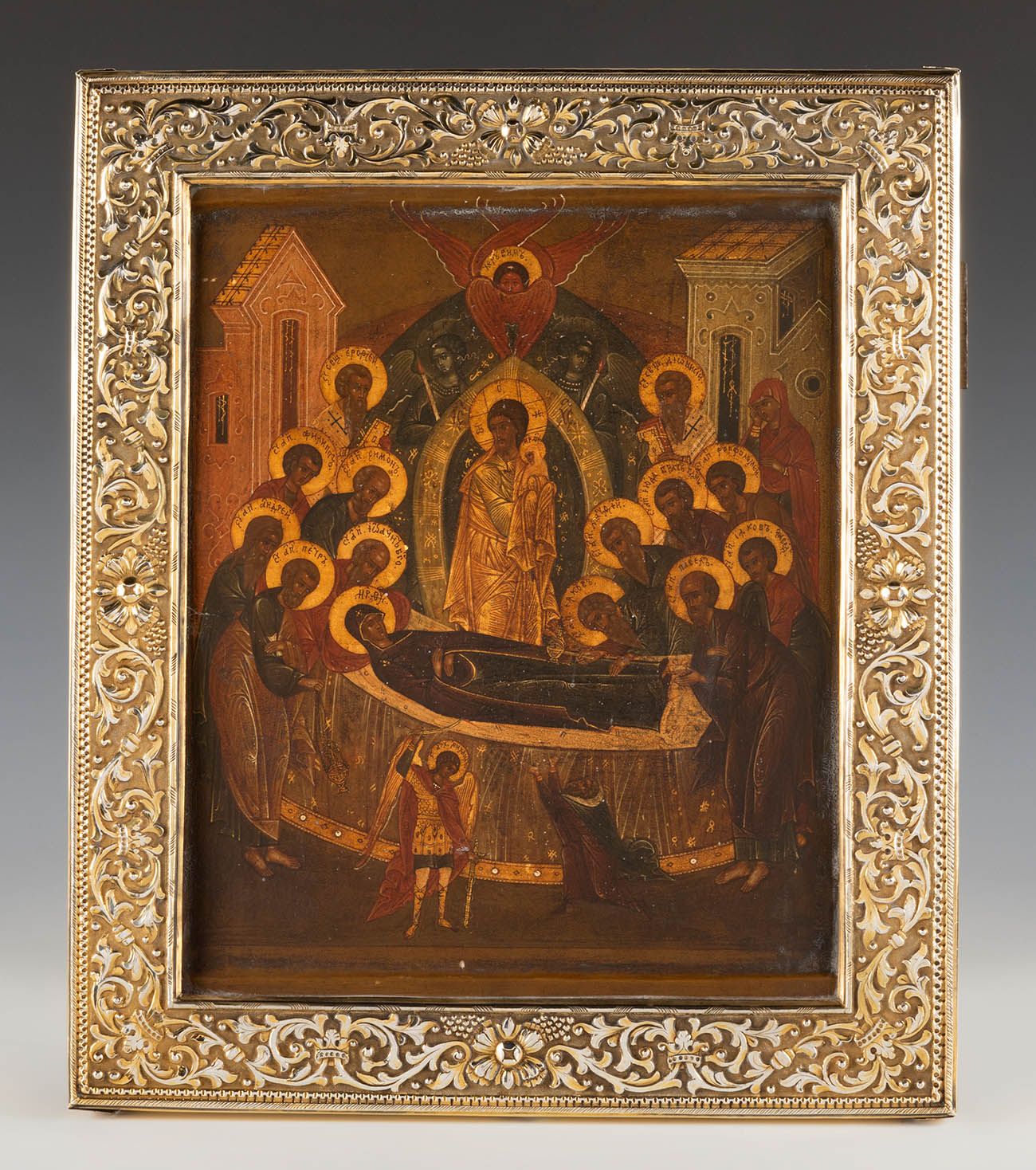Description
Russian school, 17th century. "Dormition of the Mother of God. Tempera on panel. Embossed silver frame, 19th century. With contrasts. Measurements: 31 x 26,5 cm. In this icon the anonymous artist represents the Transitus or the Dormition of Mary, the moment in which her soul is received by Christ, waiting for the Ascension to heaven in body and soul a few days later. Jesus Christ Himself, in all His heavenly glory and surrounded by a multitude of angels, in the centre of the composition and framed in a mandorla, appears to receive the soul of His Blessed Mother, who, following the symbolism of Orthodox art, takes the form of a child. Mary is accompanied at this moment, as narrated in various apocryphal Gospels, by the entire apostolic college, and we can clearly identify Saint John the Evangelist, with his youthful features, and Saint Peter brandishing a censer. As a second story, the lower part depicts Athonius, a Jewish priest who rushed at the Virgin's coffin with the intention of overturning it, but was unable to touch the bed with his hands, as an angel cut off both his hands. Architectural motifs can be found in the background, signifying that the scene takes place within an interior. It is a characteristic feature of orthodox iconography to depict interior scenes on the exterior of a building. Painters resorted to this metaphysical trick, not in search of visual verisimilitude, but in order to be able to tell the believers the maximum information about the scene through the two-dimensional medium. The chromatic range of the icon, the hieratism, the typology of the faces and the architecture help to place it chronologically in the 17th century. It is dominated by the use of red (a symbol of love but also of Christ's blood and suffering) and gold (the colour of God and his light), especially in the nimbus and the Angel's clothing. It can also be seen how the preservation of medieval traditions has always been present in Russian icons, an aspect which today gives these works of art a particular spirituality and an aura of eternity. Thus they are dominated not by the painter's innovative spirit or fantasy, but by his ability to reproduce the ideal form established over the centuries. The icon is contained in an embossed silver frame, with beautiful floral ornamentation running around the perimeter.
65
Russian school, 17th century. "Dormition of the Mother of God. Tempera on panel. Embossed silver frame, 19th century. With contrasts. Measurements: 31 x 26,5 cm. In this icon the anonymous artist represents the Transitus or the Dormition of Mary, the moment in which her soul is received by Christ, waiting for the Ascension to heaven in body and soul a few days later. Jesus Christ Himself, in all His heavenly glory and surrounded by a multitude of angels, in the centre of the composition and framed in a mandorla, appears to receive the soul of His Blessed Mother, who, following the symbolism of Orthodox art, takes the form of a child. Mary is accompanied at this moment, as narrated in various apocryphal Gospels, by the entire apostolic college, and we can clearly identify Saint John the Evangelist, with his youthful features, and Saint Peter brandishing a censer. As a second story, the lower part depicts Athonius, a Jewish priest who rushed at the Virgin's coffin with the intention of overturning it, but was unable to touch the bed with his hands, as an angel cut off both his hands. Architectural motifs can be found in the background, signifying that the scene takes place within an interior. It is a characteristic feature of orthodox iconography to depict interior scenes on the exterior of a building. Painters resorted to this metaphysical trick, not in search of visual verisimilitude, but in order to be able to tell the believers the maximum information about the scene through the two-dimensional medium. The chromatic range of the icon, the hieratism, the typology of the faces and the architecture help to place it chronologically in the 17th century. It is dominated by the use of red (a symbol of love but also of Christ's blood and suffering) and gold (the colour of God and his light), especially in the nimbus and the Angel's clothing. It can also be seen how the preservation of medieval traditions has always been present in Russian icons, an aspect which today gives these works of art a particular spirituality and an aura of eternity. Thus they are dominated not by the painter's innovative spirit or fantasy, but by his ability to reproduce the ideal form established over the centuries. The icon is contained in an embossed silver frame, with beautiful floral ornamentation running around the perimeter.
